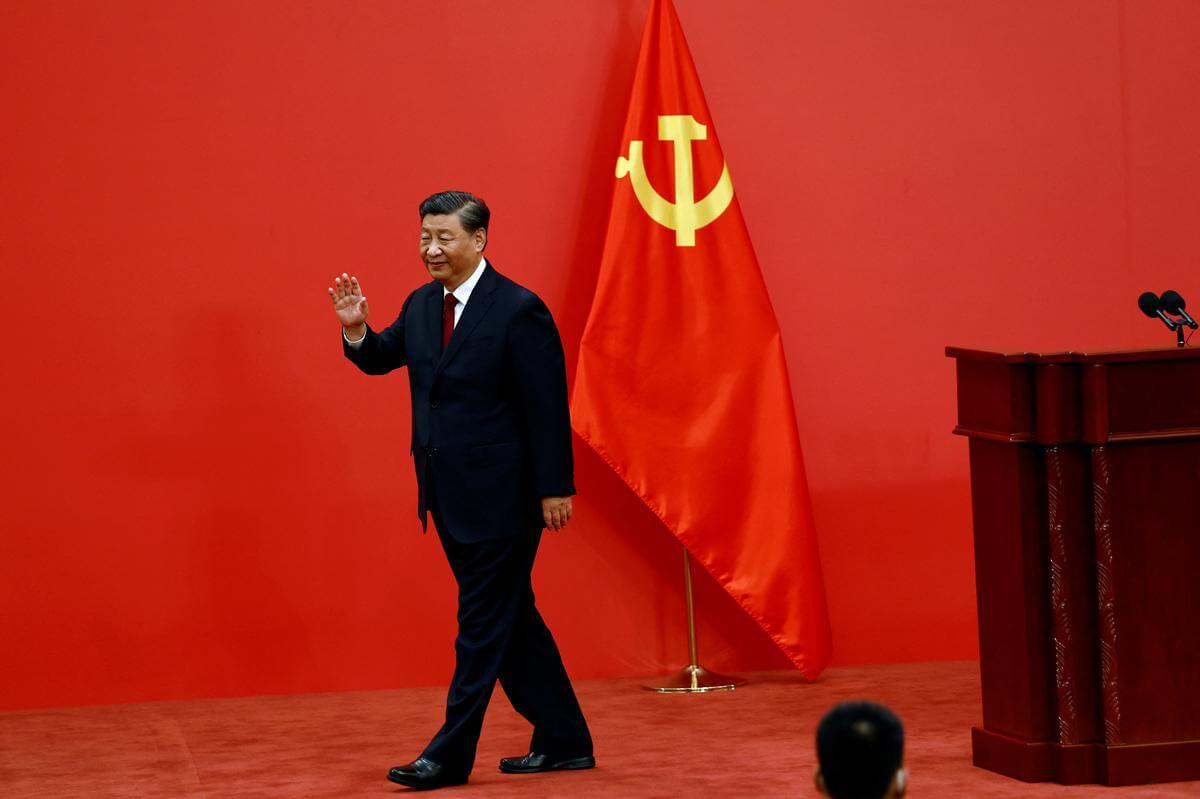Chinese President Xi Jinping secured a historic third five-year term in office on Sunday, cementing his position as the most influential leader of the country since Mao Zedong.
In his speech to the 20th CPC National Congress, Xi thanked the Communist Party of China (CPC) for its trust in his leadership. “We shall keep in mind the Party’s nature and purpose and our own mission and responsibility and work diligently in the performance of our duty to prove worthy of the great trust of the Party and our people,” he proclaimed.
Xi pledged to work towards transforming China into “a modern socialist country in all respects,” “advance toward the Second Centenary Goal,” and continue on the “path to modernisation,” which he said is “a great yet enormous undertaking.” “We must show greater historical initiative in adapting Marxism to the Chinese context and the needs of the times, write new chapters in developing socialism with Chinese characteristics in the new era, and strive hard to achieve the Chinese Dream of national rejuvenation,” he declared.
xi jinping is the world’s most powerful individual, by a long margin.
— ian bremmer (@ianbremmer) October 22, 2022
this is less than ideal.
Xi noted that the world is “grappling with unprecedented challenges.” To this end, he assured that the CPC will “ work with all other peoples to champion humanity’s common values of peace, development, equity, justice, democracy and freedom, to promote global peace and prosperity” and will “keep pursuing a human community with a shared future.”
He also stressed that “Just as China cannot develop in isolation from the world, the world needs China for its development.” The Chinese president noted that the country had succeeded in creating “the twin miracles of fast economic growth and long-term social stability” with “40 years of relentless reform and opening up.” “The Chinese economy has great resilience, potential and latitude. It will remain on a positive trajectory over the long run. China will open its door ever wider. We will be steadfast in deepening reform and opening up across the board and in pursuing high-quality development,” he asserted.
On behalf of the entire Pakistani nation, I congratulate President Xi Jinping on his reelection as CPC General Secretary for the 3rd term. It is a glowing tribute to his sagacious stewardship and unwavering devotion for serving the people of China. 🇵🇰 🇨🇳
— Shehbaz Sharif (@CMShehbaz) October 23, 2022
Xi also thanked the 600 journalists from both home and abroad who attended the event. “With your help, China’s voice and the CPC’s views have been heard across the globe and the world has turned its eyes to China. Thank you for your hard work and a job well done!” he said. He also welcomed them “to visit more places in the country” and present “unbiased and truthful stories of China, of the CPC and of the new era” to the world.
Commenting on the re-election, Chinese Foreign Ministry spokesperson Wang Wenbin said during his regular press conference on Tuesday that under Xi’s leadership, China had successfully “pursued major-country diplomacy with Chinese characteristics on all fronts, promoted the building of a human community with a shared future, firmly upheld international fairness and justice, advocated efforts to practice true multilateralism, unequivocally opposed hegemonism and power politics, and unswervingly rejected unilateralism, protectionism and bullying practice.”
“All these efforts have won wide recognition from the international community and significantly increased China’s international influence, ability to inspire, and power to shape,” he underscored.
Wang Huning, 67
— Bloomberg (@business) October 23, 2022
One of the rare few to stay comfortably within the leadership’s inner circles through decades of power struggles and transitions.
The former dean of Fudan University’s Law School has been one of the party’s most influential ideologues https://t.co/GbJJ1RojdL pic.twitter.com/Z2EUxoKOux
The head of the ruling CPC also introduced a new 24-member Politburo comprising of loyalists, which failed to include any female representatives. This marked the first time in 25 years that a woman was not made part of the elite political circle as either a full or alternate member.
Jean-Pierre Cabestan, a Chinese politics expert at Hong Kong Baptist University, opined that the move will ensure that “Power will be even more concentrated in the hands of Xi Jinping.” He remarked that the new appointees are “all loyal to Xi” and now there is “no counterweight or checks and balances in the system at all.”
Hu Jintao was 'not feeling well', says China's state state run media. pic.twitter.com/mcKNAmiN4H
— Sidhant Sibal (@sidhant) October 22, 2022
It is now predicted that the 69-year-old leader, who came to power in 2012, will stay in power for life.
The news of Xi’s re-election was also met with questions about the treatment of his predecessor, Hu Jintao, who was seen on video being forcefully escorted out of the Central Committee, prompting observers to question whether Xi was using his wide powers to purge any challenges to his rule. While China’s state media did not respond to these allegations, Xinhua News Agency tweeted hours later that Hu left the meeting due to his poor health.

